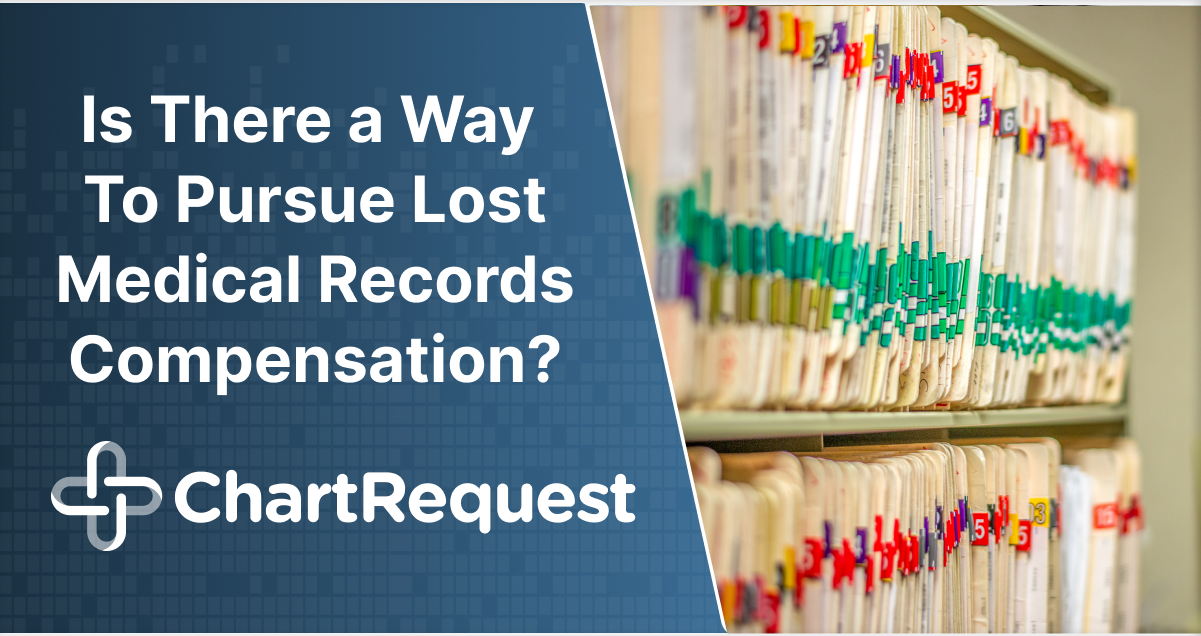You’ve visited your doctor for years, trusting that your medical records are well-maintained. Suddenly, you need to access your health charts for a specialized treatment, but the doctor can’t find them. This scenario may encourage you to pursue lost medical records compensation.
Missing medical records are more common than you might think. However, you can follow a few paths to reimbursement and record-loss prevention with the information below.
Reduce the risks of medical data loss with ChartRequest’s secure record exchange platform.
What Happens When Medical Records Go Missing?
Medical records help physicians plan and deploy effective treatment. Consequently, lost data can be detrimental to your long-term health. You may also need your medical records as evidence in a serious personal injury or medical malpractice lawsuit.
Between 2009 and 2019, healthcare data breaches led to the loss, theft, and/or exposure of nearly 231 million medical records. It’s a concerning issue, especially given the sensitive nature of medical information.
Here are some of the top culprits of medical record loss:
- Provider Errors: Human mistakes, such as misfiles, incomplete documentation, and negligence, are some of the leading causes of lost medical records. Oversights can delay necessary treatment and create incorrect diagnoses.
- System Failures: Healthcare organizations often rely on electronic systems that can fail when outdated.
- Natural Disasters: Events like fires, floods, or earthquakes can destroy paper records and damage electronic systems. During Hurricane Katrina, the loss of medical records left thousands of patients without access to quality care.
Can You Get Compensation for Lost Medical Records?
The Health Insurance Portability and Accountability Act (HIPAA) protects patients’ right to access medical records. If a healthcare provider loses your records, it may be a violation of HIPAA’s Privacy Rule.
While HIPAA doesn’t outline a compensation system for lost medical records, you may be able to pursue compensation within certain parameters. Consider your legal rights and potential settlement options for lost medical records:
Potential for Compensation
Here are a few circumstances where you can pursue reimbursements for the loss of medical records:
- Medical Malpractice: The loss of medical records can lead to harm, such as missed or delayed diagnosis. You might have reasonable grounds to file a medical malpractice claim in such cases. Trying to obtain compensation through a legal settlement or trial may be your most practical option.
- Data Breach Claims: You can potentially sue your healthcare provider if the loss of your medical records was due to a data breach or negligence, but legal costs may outweigh any potential compensation. You can also join a mass tort lawsuit if the incident involves a large number of patients who experienced similar damages.
- State Laws: Some states have specific laws that might provide additional avenues for compensation. For example, California consumers can claim $100 to $750 for lost or improperly disclosed personal data under the Consumer Privacy Act.
Steps to Take
You don’t have to jump through a dozen hoops to pursue lost medical records compensation. However, the three steps you will need to follow require a bit of attention and care:
- Document Everything: Keep a record of all communications and attempts to retrieve your medical records.
- File a Complaint: File a complaint with the Office for Civil Rights (OCR) if you suspect a HIPAA violation.
- Seek Legal Advice: Consult with a lawyer specializing in medical malpractice or data breach cases to explore your options for compensation.
What Can You Do To Prevent Lost Records?
Ensuring the security of your medical records requires a proactive approach. Here are a few actionable steps you can take:
Request Copies From Providers
Don’t be afraid to ask for copies of your medical records from your healthcare providers. Having a personal copy is essential in case healthcare staff loses the original.
Keep Digital Backups
Store digital copies of your medical records on secure internal or external hard drives. This method adds an extra layer of security and makes it easier to retrieve your records when needed.
Maintain Medical Records Organization
Keep physical copies of your medical records in a safe, easily accessible location. Use labeled folders or binders to categorize different types of records, minimizing the risk of loss and subsequent complications.
Regularly Update Records
Guarantee that your records are up-to-date by regularly requesting updates from your healthcare providers.
Take Control of Your Medical Records
Lost medical records can significantly disrupt clinical care. You can reduce these risks by taking proactive measures, such as requesting records from a fast and reliable vendor.
At ChartRequest, we optimize health data security with our modern record exchange software. With this software, you can request and view your records in one centralized location—the best way to avoid talking to your doctor on the phone!
Pursuing lost medical records compensation isn’t easy. Create an account with ChartRequest to secure your health information before it’s too late!


